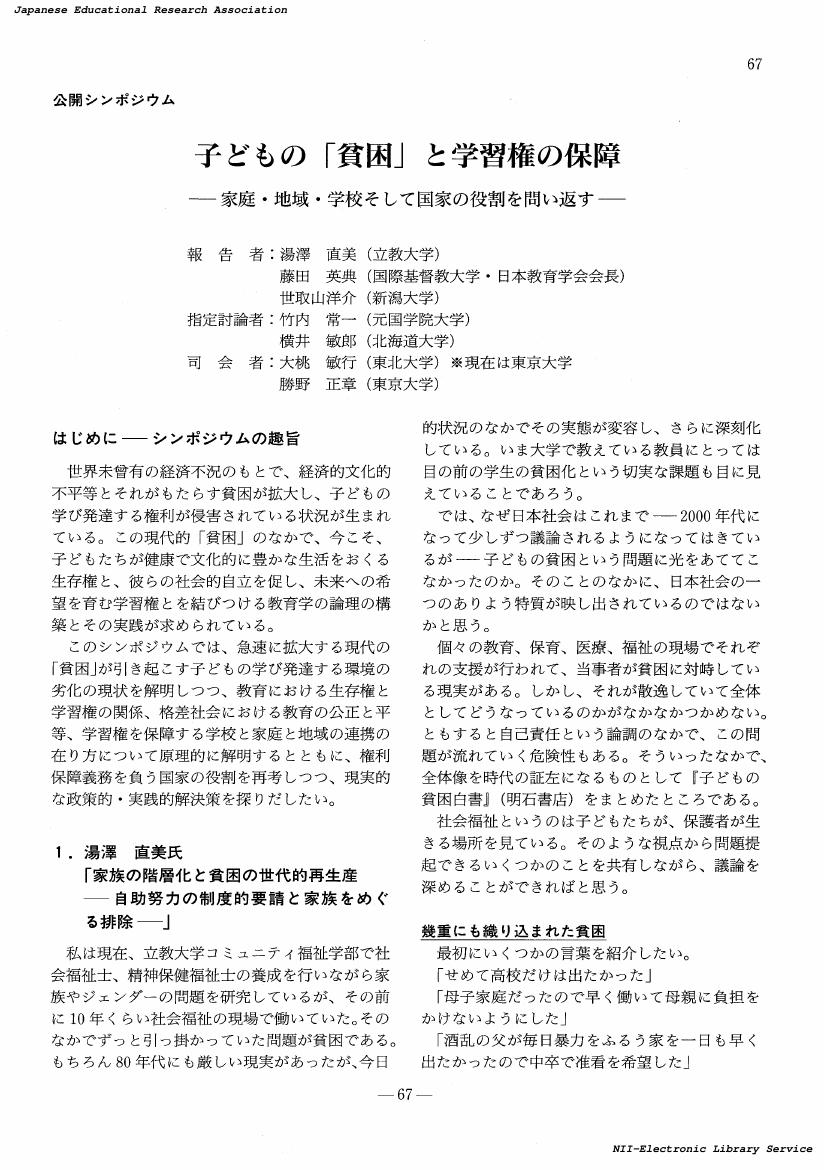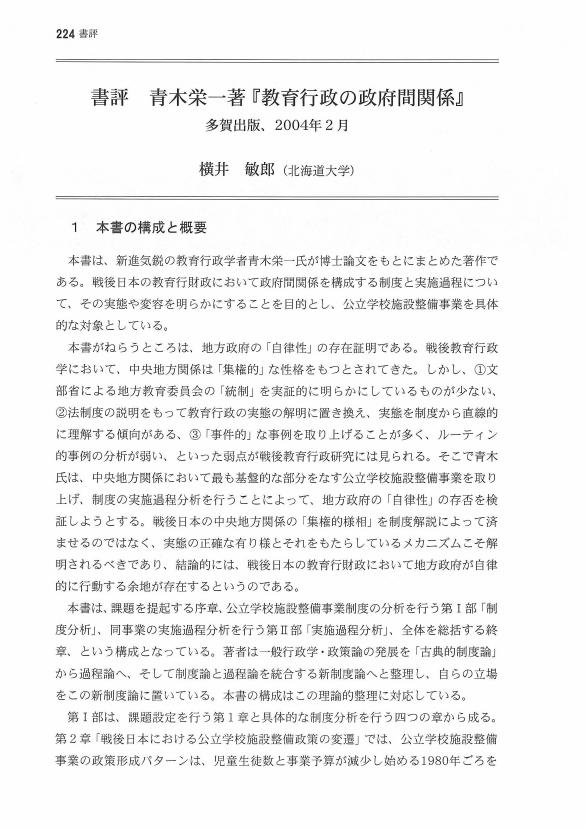29 0 0 0 OA 教育機会確保法制定論議の構図
- 著者
- 横井 敏郎
- 出版者
- 一般社団法人 日本教育学会
- 雑誌
- 教育学研究 (ISSN:03873161)
- 巻号頁・発行日
- vol.85, no.2, pp.186-195, 2018-06-30 (Released:2018-10-17)
- 参考文献数
- 39
2016年12月に「義務教育の段階における普通教育に相当する教育の機会の確保等に関する法律」が成立した。本稿は本法制定論議の時期区分と主な論点、制定に関わった主体・潮流の整理を通じて本法制定の経過と帰結を考察した。フリースクール団体の提案が法案審議に進んだのは、政策決定構造の変化を背景に、政府の能力開発・社会投資政策の枠組みに位置付けられたからである。法案についての厳しい意見対立は、教育の新たな政治的対立図式が顕在化したものと捉えられる。しかし、不登校対策を主な内容とする法の成立という帰結は、学校を越えることの困難をも示している。
4 0 0 0 OA 大都市部における若年者の教育・職業の移行とキャリア形成に関するコーホート調査
- 著者
- 乾 彰夫 中村 高康 藤田 武志 横井 敏郎 新谷 周平 小林 大祐 本田 由紀 長谷川 裕 佐野 正彦 藤田 武志 横井 敏郎 藤田 英典 長谷川 裕 佐野 正彦 佐藤 一子 本田 由紀 平塚 眞樹 大串 隆吉 関口 昌秀 上間 陽子 芳澤 拓也 木戸口 正宏 杉田 真衣 樋口 明彦 新谷 周平 安宅 仁人 小林 大祐 竹石 聖子 西村 貴之 片山 悠樹 児島 功和 有海 拓巳 相良 武紀
- 出版者
- 首都大学東京
- 雑誌
- 基盤研究(A)
- 巻号頁・発行日
- 2007
本研究は、変容する若者の学校から仕事への移行実態を把握するため、調査開始時点で20歳の若者の18歳時点から24歳までの間の就学・就労等をめぐる状態変化と、その過程での諸経験・意識等を、同一対象者を継続的に追跡するパネル方式で調査したものである。このような調査では対象者からの毎回の回答率を維持し続けることが最も重要であるが、本研究では中間段階で予定を上回る回答率を達成できていたため、調査期間を5年間に延長する計画変更をおこない、最終年度を待たず次課題繰り上げ申請を行った。調査は次課題期間にわたって継続する予定である。収集されたデータの中間的分析はおこなっているが、本格的分析は今後の課題である。
3 0 0 0 OA 高等専門学校の現状と課題:苫小牧高専を事例とする調査報告
- 著者
- 横井 敏郎
- 出版者
- 一般社団法人日本教育学会
- 雑誌
- 教育學研究 (ISSN:03873161)
- 巻号頁・発行日
- vol.73, no.4, pp.432-443, 2006-12-29
安定的な雇用が得られにくいこの時代において、若者はいかに自らの進路を見出すことができるのか、また彼らを支援できる政策や実践とはいかなるものなのか。近年の日本の若者自立支援政策は、若者と企業のマッチングを主に若者側のキャリア意識の育成によって改善しようとする労働市場政策を中心としたものにとどまっており、福祉の給付と就労を結合させたワークフェア政策として把握できる。この政策を超えて、若者の進路と支援実践に求められる視点と方向を見出すために、2つのNPOの若者支援活動を分析し、また完全参加社会やベーシック・インカムなどの新しい社会構想を検討した。これらを通じて、就労と自立、有給雇用と社会有用活動の区別、労働の権利の保障、新しい雇用と活動の創出、共同的な社会参加の道を若者たちに開いていく普遍的なシティズンシップといった視点と方向を提起した。
- 著者
- 横井 敏郎
- 出版者
- 北海道大学大学院教育学研究院 教育行政学研究室・学校経営論研究室
- 雑誌
- 公教育システム研究
- 巻号頁・発行日
- no.18, pp.127-135, 2019-09-30
2018年11月21日、北海道大学大学院教育学研究院において公開研究会「高校内居場所カフェ実践は学校に何をもたらすか―2つのカフェ運営の事例から―」を開催した。この研究会は、科研費「拡散・拡張する公教育と教育機会保障に関する国際比較研究」(18H00970、代表:横井敏郎)のメンバーである高橋寛人氏(横浜市立大学)がこの間、NPO や高校教員、行政職員等の方々とともに進めてこられた研究活動を基礎として提案いただいた企画である。 高橋氏には、過去の科研費研究会で高校内居場所カフェについて研究報告をしていただいていたが、今回、高校内居場所カフェの中でも先導的な役割を果たしている2つの運営団体の方々を招いて講演をいただき、議論を行う公開研究会を開催した。スピーカーとしてお招きしたのは、一般社団法人officeドーナツトークの田中俊英氏、NPO法人パノラマの石井正宏氏・小川杏子氏である。田中氏は大阪府立西成高校で「となりカフェ」を、パノラマの石井氏と小川氏は神奈川県立田奈高校の「ぴっかりカフェ」を運営されている。現在、高校内居場所カフェは全国で50ヶ所に上るが(朝日新聞 2019年8月19日)、その最初が西成高校の「となりカフェ」であり、次いでそれを参考に開設されたのが田奈高校の「ぴっかりカフェ」であった。今回、居場所カフェをスタートさせた2つの団体の方を招くことができたわけである。そのせいもあって、本研究会には学外者含めて30名ほどの参加を得た。 3人のスピーカーには、高校内居場所カフェの活動内容や理念、そして活動の運営上の課題や行政との関係に焦点を当てて話をしていただいた。小川氏にはふんだんに写真を用いながら、「ぴっかりカフェ」が開設された経緯とカフェの様子や役割、居場所カフェのソーシャルワーク等へのつながりなどについて話していただいた。田中氏には、「となりカフェ」が開設された経過を行政とのやり取りや高校教員との関係づくりなどの点から話していただいた。最後に石井氏には、居場所カフェを作るに当たって高校内における居場所カフェ(運営団体)の立ち位置のポイントについてお話しいただいた。その内容は、本誌の研究会記録の通りである。 高校内居場所カフェに対する関心は少しずつ高まってきているようであり、数も増えてきている(『朝日新聞』2019年8月19日)。本研究会の後になるが、高校内居場所カフェを実践してきたり、応援してきた人々の手になる書籍も刊行された。居場所カフェ立ち上げプロジェクト編『学校に居場所カフェをつくろう! 生きづらさを抱える高校生への寄り添い型支援』(明石書店、2019)には、その成り立ちからコンセプトや活動の内容、居場所カフェを作るためのポイントなどが分かりやすく書かれている。 しかし、高校内居場所カフェは始まって間もない取り組みであり、まだ十分な社会的認知を得ていないし、その実践の特質や社会的あるいは教育的な意味についてはこれから議論が本格化していくであろう。ここでは本研究会の記録の解題を兼ねつつ、高校内居場所カフェに対する認識を深めるため、それはいったいいかなるものか、その意義はどのように捉えられるのかを考えてみることとする。
- 著者
- 湯澤 直美 藤田 英典 世取山 洋介 竹内 常一 横井 敏郎 勝野 正章
- 出版者
- 一般社団法人 日本教育学会
- 雑誌
- 教育学研究 (ISSN:03873161)
- 巻号頁・発行日
- vol.77, no.1, pp.67-77, 2010-03-31 (Released:2017-11-28)
2 0 0 0 OA 若者の教育とキャリア形成に関するパネル調査の詳細分析と国際比較
- 著者
- 乾 彰夫 佐野 正彦 堀 健志 芳澤 拓也 安宅 仁人 中村 高康 本田 由紀 横井 敏郎 星野 聖子 片山 悠樹 藤田 武志 南出 吉祥 上間 陽子 木戸口 正宏 樋口 明彦 杉田 真衣 児島 功和 平塚 眞樹 有海 拓巳 三浦 芳恵 Furlong Andy Biggart Andy Imdorf Christian Skrobanek Jan Reissig Birgit
- 出版者
- 首都大学東京
- 雑誌
- 基盤研究(B)
- 巻号頁・発行日
- 2014-04-01
本研究は、代表者らグループが2007~2012年度に実施した「若者の教育とキャリア形成に関する調査」を踏まえ、①そのデータの詳細分析を行い、現代日本の若者の大人への移行をめぐる状況と課題を社会に公表すること、②他の先進諸国の同種データと比較することで日本の若者の移行をめぐる特徴と課題を明らかにすること、の2点を研究課題とした。①に関してはその成果を著書『危機のなかの若者たち』(東京大学出版会、410 頁、2017年11月)として刊行した。②に関しては海外研究協力者の参加の下、イギリス・ドイツ・スイスとの比較検討を行い、2017年3月国際ワークショップ(一般公開)等においてその結果を公表した。
2 0 0 0 OA ポートランド州立大学の一般教育改革と大学地域連携プログラム
- 著者
- 横井 敏郎
- 出版者
- 北海道大学大学院
- 雑誌
- 北海道大学大学院教育学研究科紀要 (ISSN:13457543)
- 巻号頁・発行日
- vol.81, pp.261-267, 2000-06
1 0 0 0 OA 書評 青木栄一著 『教育行政の政府間関係』 多賀出版、 2004年2月
- 著者
- 横井 敏郎
- 出版者
- 日本教育制度学会
- 雑誌
- 教育制度学研究 (ISSN:2189759X)
- 巻号頁・発行日
- vol.2007, no.14, pp.224-229, 2007 (Released:2020-04-24)
- 著者
- 横井 敏郎
- 出版者
- 一般社団法人 日本教育学会
- 雑誌
- 教育学研究 (ISSN:03873161)
- 巻号頁・発行日
- vol.71, no.2, pp.202-213, 2004
Decentralization reform has not been accomplished sufficiently enough, but some local governments are beginning to implement active educational administration. Now we can see two issues coming to the front - the relation between governor's department and board of education, and the relation between prefectural board of education and municipal board of education -. Concerning the first issue, namely "popular control", there is a friction of opinions. The purpose of this paper is to study what educational policies have been formed and implemented under what system and process, especially how two relations mentioned above have been organized and structurally changed. The object of this paper is Gifu prefecture that has had a governor who is a member of reformative governors and that has reformed the local educational system and started some new and original local measures which have not been enforced by national government. According to the analysis of this paper, Gifu prefecture are changing the administrative direction from control over municipalities to support of them, holding up "children-centered policy" and "participatory administration". But in the structure of educational administration. a new system has been made on which the govemor is able to influence the board of education more strongly. For example, deliberative organizations composed of the governor, the chairperson of prefectural assembly and the chief of board of education, and the similar organizations by which mayors can influence municipal boards of education have been established. This system is called "democratic control" of educational administration in Gifu prefecture. It is different from "popular control" that is one of the fundamental principles of educational administration in post-war Japan. It means the control over board of education by a governor. In Gifu prefecture, top-down type education reform has been led by the governor, pupils and students have been regarded as customers and autonomy of schools and municipal boards of education have not been given serious consideration enough. "Democratic control" has a contradiction of stripping of more contents from a board of education conversely. The number of education reforms which are led by govemors and mayors are increasing. To study on the contradiction and future of "popular control" in contemporary educational administration is the theoretical and practical challenge of educational administration.
- 著者
- 横井 敏郎
- 出版者
- 北海道大学大学院教育学研究院 教育行政学研究室・学校経営論研究室
- 雑誌
- 公教育システム研究
- 巻号頁・発行日
- vol.18, pp.127-135, 2019-09-30
2018年11月21日、北海道大学大学院教育学研究院において公開研究会「高校内居場所カフェ実践は学校に何をもたらすか―2つのカフェ運営の事例から―」を開催した。この研究会は、科研費「拡散・拡張する公教育と教育機会保障に関する国際比較研究」(18H00970、代表:横井敏郎)のメンバーである高橋寛人氏(横浜市立大学)がこの間、NPO や高校教員、行政職員等の方々とともに進めてこられた研究活動を基礎として提案いただいた企画である。 高橋氏には、過去の科研費研究会で高校内居場所カフェについて研究報告をしていただいていたが、今回、高校内居場所カフェの中でも先導的な役割を果たしている2つの運営団体の方々を招いて講演をいただき、議論を行う公開研究会を開催した。スピーカーとしてお招きしたのは、一般社団法人officeドーナツトークの田中俊英氏、NPO法人パノラマの石井正宏氏・小川杏子氏である。田中氏は大阪府立西成高校で「となりカフェ」を、パノラマの石井氏と小川氏は神奈川県立田奈高校の「ぴっかりカフェ」を運営されている。現在、高校内居場所カフェは全国で50ヶ所に上るが(朝日新聞 2019年8月19日)、その最初が西成高校の「となりカフェ」であり、次いでそれを参考に開設されたのが田奈高校の「ぴっかりカフェ」であった。今回、居場所カフェをスタートさせた2つの団体の方を招くことができたわけである。そのせいもあって、本研究会には学外者含めて30名ほどの参加を得た。 3人のスピーカーには、高校内居場所カフェの活動内容や理念、そして活動の運営上の課題や行政との関係に焦点を当てて話をしていただいた。小川氏にはふんだんに写真を用いながら、「ぴっかりカフェ」が開設された経緯とカフェの様子や役割、居場所カフェのソーシャルワーク等へのつながりなどについて話していただいた。田中氏には、「となりカフェ」が開設された経過を行政とのやり取りや高校教員との関係づくりなどの点から話していただいた。最後に石井氏には、居場所カフェを作るに当たって高校内における居場所カフェ(運営団体)の立ち位置のポイントについてお話しいただいた。その内容は、本誌の研究会記録の通りである。 高校内居場所カフェに対する関心は少しずつ高まってきているようであり、数も増えてきている(『朝日新聞』2019年8月19日)。本研究会の後になるが、高校内居場所カフェを実践してきたり、応援してきた人々の手になる書籍も刊行された。居場所カフェ立ち上げプロジェクト編『学校に居場所カフェをつくろう! 生きづらさを抱える高校生への寄り添い型支援』(明石書店、2019)には、その成り立ちからコンセプトや活動の内容、居場所カフェを作るためのポイントなどが分かりやすく書かれている。 しかし、高校内居場所カフェは始まって間もない取り組みであり、まだ十分な社会的認知を得ていないし、その実践の特質や社会的あるいは教育的な意味についてはこれから議論が本格化していくであろう。ここでは本研究会の記録の解題を兼ねつつ、高校内居場所カフェに対する認識を深めるため、それはいったいいかなるものか、その意義はどのように捉えられるのかを考えてみることとする。
1 0 0 0 OA 現代自治体子育て・教育行政の調査研究 : 「子どもが健やかに育つまち」をめざす恵庭市
1 0 0 0 IR ポスト55年体制下の知事 : 教育委員会関係 : 鳥取県片山県政の教育政策過程
- 著者
- 横井 敏郎
- 出版者
- 北海道大学大学院教育学研究院
- 雑誌
- 北海道大学大学院教育学研究院紀要 (ISSN:18821669)
- 巻号頁・発行日
- no.122, pp.107-123, 2015
This Study aims to clarify the decision process of the local education policy under the post-1955 political system in Japan, focusing on relations between the prefectural governor and the board of education, in the case of Katayama government in Tottori prefec ture. Firstly, we can find that a lot of new education measures got available in Tottori in the 2000s and they were promoted by the governor Yoshihiro Katayama. To the second, we can see that the pressure to the Board of Education from the governor was brought out by the Ministry of Education orientation and the closed organization culture of the Board of Education. The prefecture Board of Education were so poor in the ability for policy making and the resources to build up the education measures to contribute to local development. The governor had to activate the Board of Education through various routs like personnel affairs of the Board of Education, the collaboration in policymaking between the governor's office and the Board of Education. Thirdly, while the independence of Board of Education was expected, it remained at the position of the follower to the end. We found that the menber of the Board of Education could not make policies independently and represent the resident's preference, even if they got the support of the governor. From this case study, we see that it is very difficult for the Board of Education to obtain the democratic legitimacy even under the governor that attached great value to resident autonomy. It is a big challenge for us to explore the way to balance power in the local educational governance and enhance the democratic legitimacy of the Board of Education.
1.調査し得た対象校は、北海道で13工業高校中10校、東京地区で9工業高校、東北地区で5校であり、そのほか工業高等専門学校、ポリテクカレッジ、職業訓練校、都立科学技術大学、教育行政諸機関なども訪ねた。さらにアメリ力との比較研究のためオレゴン州の高校および関連諸施設・機関を調査した。2.研究成果については折に触れ論文等にしたが、それらについては別紙を参照してほしい。成果の発表の場は、日本教育学会第57大会のほか、文部省主催の全国フォーラム、北大教育学部創設50周年記念国際シンポ、北海道工薬高校校長会などの場で報告発表しれた。そのほか『調査報告・資料集』を3分冊(No.1〜3)にして刊行し、関連機関に配布した。また研究代表者の小出は、この間文部省産業教育審議会や北海道教委教育計画推進会議の委員を果たし、その点でも研究成果を社会に還元できた。3.工業高校の改革を推進する上での二つの仮説はほぼ論証し得た。仮説は、(1)地域連携の強化、(2)高等教育機関との接続の強化、の二つであるが、いずれも不可避の課題として自覚化されつつあるし、また実現の条件もできつつある。とはいえ日本の場合は遅れており、オレゴンの高校改革ほどには進展していない。4.今後は、本調査研究で得た諸事実を理論化することが課題となるが、その際本研究の理論的シューマである、平等性、差異性、責任性の4改革原理を中心にまとめることになる。
1 0 0 0 OA 社会的に排除された若者の自立支援における社会関係資本形成の意義に関する実証的研究
- 著者
- 宮崎 隆志 横井 敏郎 上原 慎一 石黒 広昭 藤野 友紀 間宮 正幸 大高 研道 日置 真世 武田 るい子 大高 研道 向谷地 生良 仲真 紀子 駒川 智子
- 出版者
- 北海道大学
- 雑誌
- 基盤研究(B)
- 巻号頁・発行日
- 2007
社会的に排除された若者の移行支援の課題を明らかにした。彼・彼女らの「生きづらさ」の背後には、生活世界を構成する諸コミュニティの断片化がある。したがって移行支援のためには断片化したコミュニティを再統合することが必要であるが、そのためには多様性が保障された新たな媒介的コミュニティを構築することが有効であること、およびそのコミュニティを中心にした地域的な支援システムを構想することが必要であることを明らかにした。


